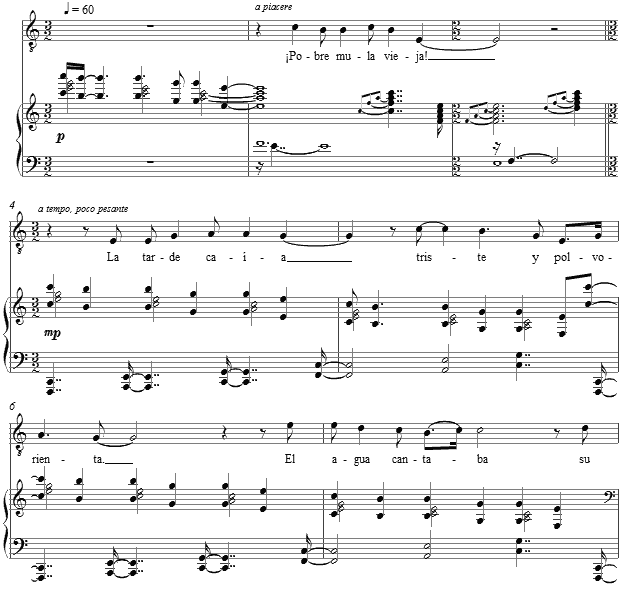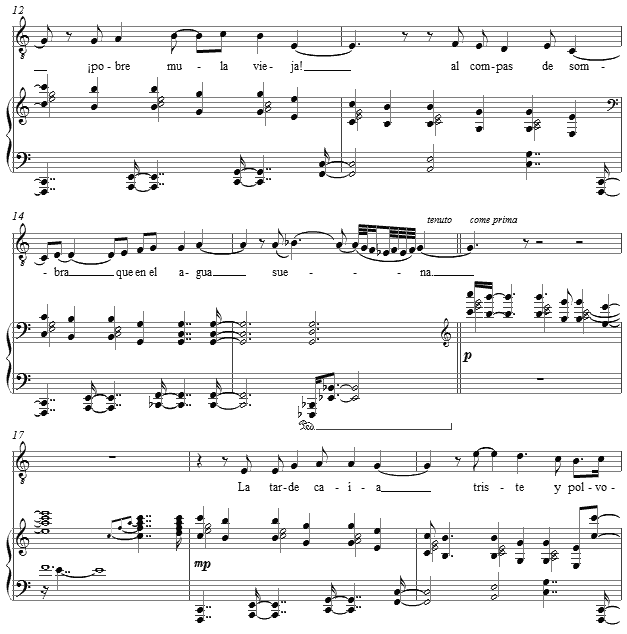Music and Texts of GARY BACHLUND
Vocal Music | Piano | Organ | Chamber Music | Orchestral | Articles and Commentary | Poems and Stories | Miscellany | FAQs
La noria - (2008)
Antonio Machado
for tenor and piano
La tarde caía
triste y polvorienta.
El agua cantaba
su copla plebeya
en los cangilones
de la noria lenta.
Soñaba la mula
¡pobre mula vieja!,
al compás de sombra
que en el agua suena.
La tarde caía
triste y polvorienta.
Yo no sé qué noble,
divino poeta,
unió a la amargura
de la eterna rueda
la dulce armonía
del agua que sueña,
y vendó tus ojos,
¡pobre mula vieja!...
Mas sé que fue un noble,
divino poeta,
corazón maduro
de sombra y de ciencia.[ 4 pages, circa 4' 00" ]
Antonio Machado
Antonio Machado (1875-1939) was a Spanish poet and one of the leading figures of the Spanish literary movement known as the Generation of '98, whose birth name was Antonio Cipriano José María y Francisco de Santa Ana Machado y Ruiz. Often said to be the most popular poet in Spain, he was born in Seville, moved with his parents to Madrid at the age of 8, and then to Soria in Castile, where he taught French, describing himself as "a humble teacher in a rural institute." Machado finished a doctoral degree in philosophy at the University of Madrid and in 1927 was elected to the Spanish Academy. His early poetry, including Soledades (1903) and Soledades, galerías y otros poemas (1907) were strongly influenced by the French modernista movement. Marriage in 1909 to 16-year old Leonor resulted in his happiest and most fertile poetic period, including what is arguably his best work, Campos de Castilla (1912). After his wife died a few years into their marriage, Machado moved to Baeza in the upper Andalusia. At the start of the Civil War he traveled to Valencia to support the Republic. In February, 1939, he fled across the Pyrenees with his mother and a brother, but became ill during the trip and died shortly thereafter in Collioure, a small French village. Machado's Obras Completas (Complete Works) were published in 1947.
The waterwheel
Evening fell
sad and dusty.
The water was singing
its rustic verse
in the pockets
of the weary water wheel.
The mule was dreaming
-- poor old mule! --
to the rhythm of shadows
drowsing in the water.
Evening fell
sad and dusty.
I don't know which poet,
noble and divine,
joined the sorrow
of the eternal wheel
to the sweet music
of the sleepy water
and covered your eyes
-- poor old mule!
It must have been a poet,
noble and divine,
a heart matured
by nighttime and knowledge.
Translation, courtesy of Professor Douglas Duno
Composed for tenor voice, the range is accessible to a high baritone as well. The gentle exclamation -- "¡pobre mula vieja!" -- is used at the beginning of the setting. The meter of 3/2 underscores the circular plodding of the mule driving the actions of the water wheel, as the large gestures in the accompaniment repeat in a cyclic manner. The slight syncopation of the bass line imagines the gently hobble of one hoof in front of another.
A moment in time is suspended with the melismatic vocal line ending the first strophe of the song setting, much as Machado breaks his poem into sections by indentation.
The score for La noria is available as a free PDF download, though any major commercial performance or recording of the work is prohibited without prior arrangement with the composer. Click on the graphic below for this piano-vocal score.


